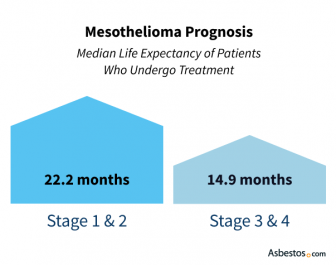
Mesothelioma Prognosis
Mesothelioma often leads to a prognosis of just 12 to 21 months post-diagnosis, with only a few cases of survival exceeding a decade. The 5-year survival rate for mesothelioma is 12%.
Written byDr. Daniel A. Landau•Edited ByWalter Pacheco•Medically Reviewed ByDr. Jacques Fontaine
Asbestos.com is the nation’smost trustedmesothelioma resource
The Mesothelioma Center at Asbestos.com has provided patients and their loved ones the most updated and reliable information on mesothelioma and asbestos exposure since 2006.
Our team of Patient Advocates includes a medical doctor, a registered nurse, health services administrators, veterans, VA-accredited Claims Agents, an oncology patient navigator and hospice care expert. Their combined expertise means we help any mesothelioma patient or loved one through every step of their cancer journey.
More than 30 contributors, including mesothelioma doctors, survivors, health care professionals and other experts, have peer-reviewed our website and written unique research-driven articles to ensure you get the highest-quality medical and health information.
About The Mesothelioma Center at Asbestos.com
- Assisting mesothelioma patients and their loved ones since 2006.
- Helps more than 50% of mesothelioma patients diagnosed annually in the U.S.
- A+ rating from the Better Business Bureau.
- 5-star reviewed mesothelioma and support organization.
Testimonials
My family has only the highest compliment for the assistance and support that we received from The Mesothelioma Center. This is a staff of compassionate and knowledgeable individuals who respect what your family is experiencing and who go the extra mile to make an unfortunate diagnosis less stressful. Information and assistance were provided by The Mesothelioma Center at no cost to our family.LashawnMesothelioma patient’s daughter
How to Cite Asbestos.com’s Article
APA
Landau, D. A. (2023, September 14).Mesothelioma Prognosis.Asbestos.com. Retrieved October 11, 2023, from //www.magnakarsa.com/mesothelioma/prognosis/
MLA
Landau, Daniel A. "Mesothelioma Prognosis."Asbestos.com, 14 Sep 2023, //www.magnakarsa.com/mesothelioma/prognosis/.
Chicago
Landau, Daniel A. "Mesothelioma Prognosis." Asbestos.com. Last modified September 14, 2023. //www.magnakarsa.com/mesothelioma/prognosis/.
What Is the Prognosis for Mesothelioma?
The mesothelioma survival rate is about 12 to 21 months with treatment. While most face an unfavorable prognosis with less than a year of survival, a few defy the odds, living more than 10 years. The current 5-year survival rate for mesothelioma stands at 12%.
Factors affecting a mesothelioma prognosis include the stage of the disease, the patient’s overall health and the type ofmesothelioma treatmentsreceived.
A mesothelioma prognosis is what doctors describe as a patient’s outlook. It is individual and based on the average survival of other patients. Statistics play a role in prognosis, but everymesotheliomacase is unique.
Doctors will likely talk to their patients about other factors, such as survival rates and life expectancy, which are related to their mesothelioma prognosis.
- Survival Rates:Themedian mesothelioma survival rateis 12 to 21 months with treatment.
- 生活Expectancy:Theaverage mesothelioma life expectancyis 1-2 years with treatment.
- Death Rate:The间皮瘤死亡率is around 8 deaths per million people.
Cancer treatment is one factor that patients can control. Ongoing treatment can help keep cancer under control. Some patients live more than a decade after therapy.
What Factors Can Affect Your Mesothelioma Prognosis?
The most important factors of a mesothelioma prognosis are origin site, cell type and stage. General health and other personal factors also play a role.
Mesothelioma Tumor Location and Size
Research shows about 40% ofpleural mesothelioma patientssurvive at least one year. Roughly 9% of patients with pleural type survive more than five years.
Peritoneal mesotheliomapatients survive approximately six months without treatment or 13 months with chemotherapy alone. About half of peritoneal patients who receive surgery with heated chemotherapy live longer than five years.
Roughly half of pericardial patients survive six months. Rare cases of five-year survival involve surgery and chemotherapy. Average survival of testicular mesothelioma is around two years, but some patients may live more than a decade.
Mesothelioma Cell Type
Thetypes of mesothelioma cellsthat make up the tumor can impact your prognosis. Identifying which cells are present is an essential part ofdiagnosing mesothelioma.
- Epithelioid Cells:Patients with this cell type tend to live longer than those with other cell types. People with epithelioid tumors live an average of 200 days longer.
- Sarcomatoid Cells:These cells are associated with the poorest prognosis because they are considered more aggressive and harder to treat. The average prognosis is six to eight months.
- Biphasic Cells:The prognosis for this type depends on the ratio of sarcomatoid to epithelial cells. The more epithelial cells, the better the prognosis.
In a2020 study from Oncology Reports, epithelial cell type correlated with a specific protein that is associated with prolonged survival.

Mesothelioma Stage and Metastasis
The cancer stage impacts prognosis because treatment becomes less effective in later stages.
- Stage 1patients who undergo surgery have a median life expectancy of 22.2 months.
- Stage 4 mesotheliomapatients who undergo treatment have a median life expectancy of 14.9 months.
In the final stage,mesothelioma metastasisinvolves local extensive tumor spreading. About 10% to 50% of stage 4 mesothelioma cases develop distant metastases, but tumors are more likely to spread near the origin.
Patient Health and Demographics
Younger people have a better prognosis with mesothelioma than older people.
- Patients under 50:More than half of patients diagnosed in this span live at least a year.
- Patients over 75:Less than a third of those diagnosed over this age live that long.
Gender has a significant impact on mesothelioma prognosis.Women with mesotheliomalive longer than men. Race also plays a role in mesothelioma prognosis. In 2013, the five-year survival rate was 8.7% for white patients and 10% for Black patients.
Treatment

Treatments that may improve prognosis include surgery, chemotherapy, radiation, immunotherapy and Tumor Treating Fields.
Surgery allows some patients to live years beyond the average one-year survival. About 20% of pleural patients receive the early-stage diagnosis needed to qualify for surgery.
About half of mesothelioma patients who undergo chemotherapy have tumor shrinkage. Some people see no new tumors for extended periods. Adding targeted therapy or Tumor Treating Fields may improve survival from 12 to 18 months.

Top Ways to Improve Your Mesothelioma Prognosis
You can choose to be proactive and take steps to improve your prognosis. Although you can’t change your age or cancer stage, you can choose to seek treatment and make healthy lifestyle choices.
- Seek out a clinical trial:Clinical trials can improve prognosis through experimental drugs. Some patients respond better to medicines still under investigation.
- Make healthier lifestyle choices:Gentle exercise and a balanced diet can ease side effects and improve cancer symptoms.
- Join a support group:Participating in support groups can help people cope by reducing anxiety, emotional distress, fatigue and pain.
Patients can also use relaxation techniques, such as guided imagery and progressive muscle relaxation, which may help patients better cope with their diagnosis.
I would tell anyone who gets diagnosed with this disease, don’t just take the first advice you get and give up. Look around and see what is out there.Gene HartlineDiagnosed with pleural mesothelioma in 2016
Survivors Who Surpassed Their Mesothelioma Prognosis
Although recurrence is common, people diagnosed with mesothelioma are overcoming their initial prognoses.Remissionis having no signs or symptoms of active cancer.
部分缓解肿瘤大小减少50%and full remission is complete tumor disappearance. Complete remission is rare with mesothelioma. Partial remission is more common. Patients can live for years in partial remission.
It’s important to keep hope alive. Some survivors live years or even a decade or more past their initial prognosis.

Survivors Who Surpassed Their Prognosis
Although recurrence is common, people diagnosed with mesothelioma are overcoming their initial prognoses.
It’s important to keep hope alive. Some survivors live years or even a decade or more past their initial prognosis.
Diagnosed in 2005, Chris Gibney far surpassed his pleural mesothelioma diagnosis. In March 2017, he and his wife welcomed a group of exchange students from Germany to their home. Gibney credits his excellent medical team and a family support group for surviving more than a decade past his prognosis.
At the time of Beth Mixon’s peritoneal mesothelioma diagnosis in 2000, the majority of patients lived less than two years after treatment. Despite a grim prognosis, Mixon is still going strong 17 years after an aggressive cytoredutive surgery.
Diagnosed with peritoneal mesothelioma in 2010, Kasie Coleman underwent several cycles of chemotherapy and HIPEC treatments. Her cancer went into remission in 2012.
Common Questions About Mesothelioma Prognosis
- What is the prognosis for malignant mesothelioma?
-
The prognosis for malignant mesothelioma is poor. However, emerging treatments and mesothelioma awareness are improving patient life expectancy.
- What are the survival rates for mesothelioma?
-
The 5-year pleural mesothelioma survival rate is 9.6%, and most people live around 12 months. The 5-year survival rate for peritoneal mesothelioma is 65%, and people who undergo surgery live at least 60 months. Average survival for peritoneal patients who only receive chemotherapy is 13 months.
- Is mesothelioma always terminal?
-
While mesothelioma is considered terminal, it is not always fatal. A small number of patients have outlived their prognosis by more than a decade and died of another cause.
- How long can you live with mesothelioma?
-
Most people with mesothelioma live between four and 18 months, but some people have lived longer than 10 years with this type of cancer.
- Is there a cure for mesothelioma?
-
It’s not possible to cure mesothelioma, but doctors use treatments to control tumor growth and cancer symptoms.
- How can a mesothelioma specialist improve my prognosis?
-
Mesothelioma specialists have spent years learning about mesothelioma treatment, and they know how to treat this cancer better than general oncologists. Working with a specialist is the best way to improve your prognosis.














